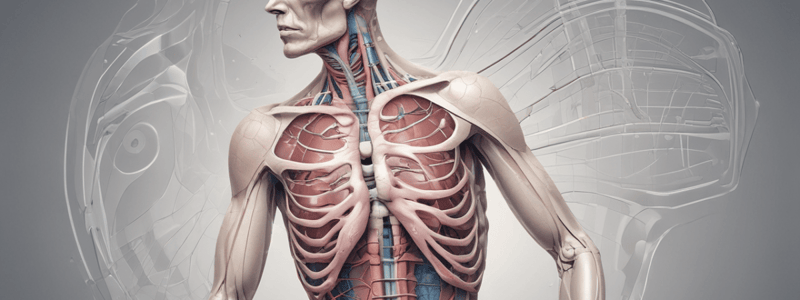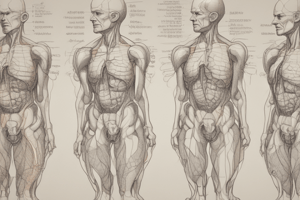Podcast
Questions and Answers
Where do Spigelian Hernias typically occur?
Where do Spigelian Hernias typically occur?
- In the diaphragm
- In the oesophagus
- In the abdominal wall
- Between the muscle fibres of the abdominal wall (correct)
What is a common symptom of Hiatal Hernias?
What is a common symptom of Hiatal Hernias?
- Abdominal pain
- Nausea and vomiting
- Fever and fatigue
- Reflux of acid from the stomach into the oesophagus (correct)
What is the second leading cause of small bowel obstruction?
What is the second leading cause of small bowel obstruction?
- Adhesions
- Inflammatory bowel disease
- Diverticulitis
- Abdominal wall hernias (correct)
What is an irreducible hernia diagnosed as?
What is an irreducible hernia diagnosed as?
What is the result of ischemia caused by a compromised blood supply?
What is the result of ischemia caused by a compromised blood supply?
How are hernias often diagnosed?
How are hernias often diagnosed?
What can cause Spigelian Hernias to develop?
What can cause Spigelian Hernias to develop?
What is the primary cause of a hernia?
What is the primary cause of a hernia?
What is a characteristic of Hiatal Hernias compared to other types of hernias?
What is a characteristic of Hiatal Hernias compared to other types of hernias?
Which of the following activities is NOT a common cause of hernia?
Which of the following activities is NOT a common cause of hernia?
What is the name of the type of hernia that occurs in the lower abdomen near the pubic area?
What is the name of the type of hernia that occurs in the lower abdomen near the pubic area?
What is a common symptom of an inguinal hernia?
What is a common symptom of an inguinal hernia?
What is a characteristic of a direct inguinal hernia?
What is a characteristic of a direct inguinal hernia?
What is a possible complication of coughing or straining with an inguinal hernia?
What is a possible complication of coughing or straining with an inguinal hernia?
Which of the following medical conditions can increase the risk of developing a hernia?
Which of the following medical conditions can increase the risk of developing a hernia?
What can happen to the hernia when lying down?
What can happen to the hernia when lying down?
What is the primary characteristic of a Sportsman's Hernia?
What is the primary characteristic of a Sportsman's Hernia?
Where do femoral hernias typically appear?
Where do femoral hernias typically appear?
What is the main difference between femoral hernias and inguinal hernias?
What is the main difference between femoral hernias and inguinal hernias?
What is the typical cause of umbilical hernias in adults?
What is the typical cause of umbilical hernias in adults?
When can incisional hernias appear?
When can incisional hernias appear?
What is the most significant risk associated with femoral hernias?
What is the most significant risk associated with femoral hernias?
Which type of hernia is more common in men?
Which type of hernia is more common in men?
What is the recommended approach for treating a Sportsman's Hernia?
What is the recommended approach for treating a Sportsman's Hernia?
What is the usual course of action for a hernia without symptoms?
What is the usual course of action for a hernia without symptoms?
What is the primary goal of physiotherapy in managing hernia symptoms and risk?
What is the primary goal of physiotherapy in managing hernia symptoms and risk?
What is the standard surgical technique for most abdominal wall hernias?
What is the standard surgical technique for most abdominal wall hernias?
What is the focus of the rehabilitation period after hernia surgery?
What is the focus of the rehabilitation period after hernia surgery?
What is the purpose of abdominal X-rays in hernia management?
What is the purpose of abdominal X-rays in hernia management?
What is one of the ways physiotherapy can help reduce symptoms and/or risk of hernia?
What is one of the ways physiotherapy can help reduce symptoms and/or risk of hernia?
Flashcards are hidden until you start studying
Study Notes
Definition and Causes of Hernia
- A hernia occurs when an internal part of the body pushes through a weakness in the muscle or surrounding tissue wall.
- Hernias usually develop between the chest and hips.
- Activities and medical problems that increase pressure on the abdominal wall can lead to a hernia, including:
- Straining on the toilet
- Persistent cough
- Cystic fibrosis
- Enlarged prostate
- Straining to urinate
- Being overweight or obese
- Abdominal fluid
- Lifting heavy items
- Peritoneal dialysis
- Poor nutrition
- Smoking
- Physical exertion
- Undescended testicles
Types of Hernia
- Inguinal Hernias: located in the lower abdomen, can occur on both sides of the pubic area, classified as direct or indirect.
- Sportsman Hernia: a condition of chronic exercise-related supra-inguinal groin pain, often without visible swelling.
- Femoral Hernias: occur just below the groin crease, more common in women, can lead to incarceration or strangulation.
- Incisional Hernias: appear at the site of a previous surgery, can vary in size, and may develop weeks, months, or years after surgery.
- Umbilical Hernias: occur near the bellybutton, may occur in infants, but can persist throughout life.
- Epigastric Hernias: occur due to a weakness in the muscles or tendons of the upper abdominal wall, more common in men.
- Spigelian Hernias: a rare type of hernia that occurs between the muscles of the abdominal wall, often on the right-hand side of the abdomen.
- Hiatal Hernias: occur in the diaphragm, can cause reflux of acid from the stomach into the oesophagus, leading to heartburn and pain.
Symptoms of Hernia
- Small bulge in the groin or abdomen
- Swollen scrotum
- Weakness, heaviness, or pain in the groin
- Burning or pinching sensation in the groin
- Pain that improves with rest and worsens with lifting, coughing, or straining
Complications of Hernia
- Bowel Obstruction: can lead to small bowel obstruction
- Incarceration: an irreducible hernia that cannot be pushed back manually
- Strangulation: caused by a compromised blood supply
Diagnosis and Treatment of Hernia
- Diagnosed through physical exam, sometimes with ultrasound or abdominal X-rays
- Treatment may involve watching and waiting, but surgical repair is often necessary
- Surgical procedures include open or laparoscopic suture repair, and the use of mesh
- Physiotherapy can help reduce symptoms and risk of hernia by reducing pressure, strengthening supporting tissue, and applying compression support
- Rehabilitation period after hernia surgery involves gentle stretching exercises to strengthen core muscles
Studying That Suits You
Use AI to generate personalized quizzes and flashcards to suit your learning preferences.




